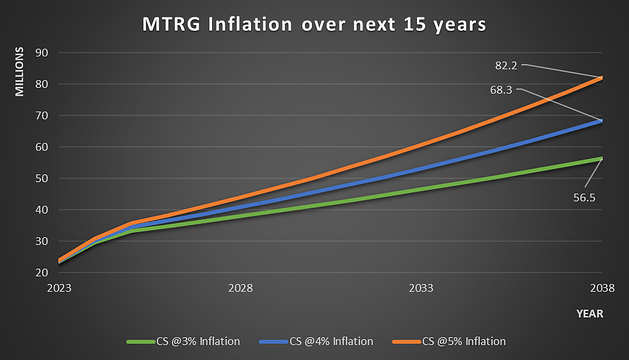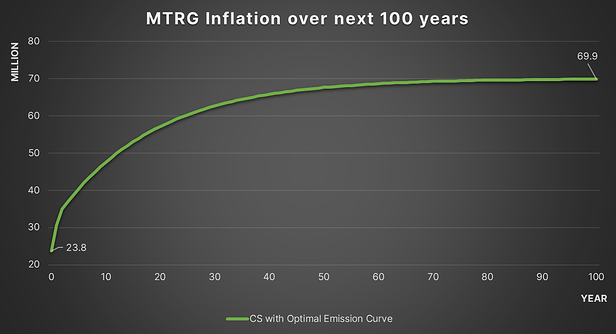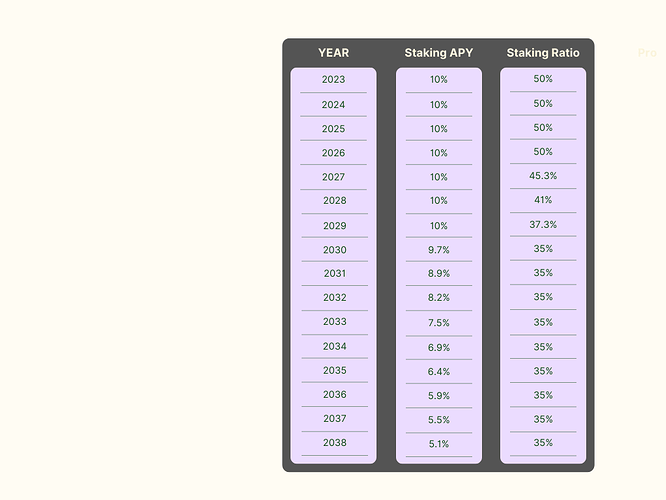Meterians,
We are pleased to present this Improvement Proposal to deploy an optimal token emission curve for MTRG.
TLDR
- Change in MTRG emission curve – From current 5% annual inflation to a logarithmic emission curve
- Cap on maximum supply of MTRG
Background
The Layer 1 Meter mainnet went live on July 4, 2020 with fully permissionless node operations live since March 19, 2021 (https://scan.meter.io/).
The Meter Network currently has a 5% annual emission which has played a critical role to onboard over 334 validators and 46% staking ratio thereby making the Meter Network more secure.
This Tail emission where validators and delegators are rewarded with newly minted tokens for participating in the network helps us maintain the incentives for validators to participate in the network and secure the blockchain.
Without long-term inflation, a blockchain is fundamentally insecure. Without a fee-burning mechanism on top of long-term inflation, a token cannot be truly scarce, thereby rendering it non-competitive. Both are therefore required for an ideal blockchain design.
However, the current emission schedule means that there is no max supply Cap on the MTRG in circulation. This is irrespective of whether we continue with current 5% annual inflation or reduce it overtime.
This inflation means the MTRG held by its large community loses value over time. The intrinsic value attached to MTRG depends on the supply and demand. As MTRG inflation continues with no supply cap, so does the community’s willingness to hold the token, further losing its value.
We believe it is time to shift towards a more optimal token emission rate which continues incentivizing network participation and development while also maintaining network security and avoiding inflation.
Proposal Details
Historical MTRG emission
Since its inception in April 2021, a total of 4.81 million MTRG (as on 28 July 2023) have been added into circulation on Meter Network. This is evident from the total supply increase in MTRG reported on CoinGecko and CoinMarketCap
https://www.coingecko.com/en/coins/meter-governance
Current Token Emission Curve
With the current annual inflation of 5%, we will see over 82 Million MTRG in circulation by the end of 2038.
With variations in annual inflation for 3% to 5%, we can estimate the Total Supply of MTRG in the next 15 years.
Proposed Emission Curve
With an aim to shift towards a more optimal token emission rate and introduce a supply cap on MTRG inflation, we propose a logarithmic emission curve.
With this proposal to change to a logarithmic curve, the MTRG emission increases rapidly at first, to slow down considerably later, before finally leveling off as it approaches an asymptote over the duration of the curve.
| Maximum Emission | 40,000,000 MTRG |
|---|---|
| Duration of Emission | 100 Years |
| Emission Halving | Every 4 years |
The Emission Formula proposed is:

With the Emission curve, we can determine the maximum supply of MTRG by the end of 100 years as below;
Max MTRG Supply=Current Total Supply+40 Million
Max MTRG Supply=45.1+40 Million
Max MTRG Supply=85.1 Million
Impact on Staking Yield
Assuming the staking ratio, the yield can be estimated for the next 15 years as below;
Please note that as the staking ratio reduces, Yield increases and vice-versa.
Fee Burning Mechanism
It is important to note that, with this proposal, we put a cap on the maximum supply of MTRG. This works in conjunction with the fee burning mechanism already in place which puts a deflationary pressure on MTRG supply.
Voting Information
Vote timing: The proposal will incorporate any feedback from the community before it is presented to the governance forum. In case there are no updates requested by the community to the proposal, the governance vote will be scheduled for 7 August 2023 (post 7 day community review)
Interim Period: During the period between the new emission curve is ratified through governance and deployment of the emission curve, network inflation will be determined as per current annual emission of 5%
Vote metrics: The vote needs a simple majority of those who vote to pass.


